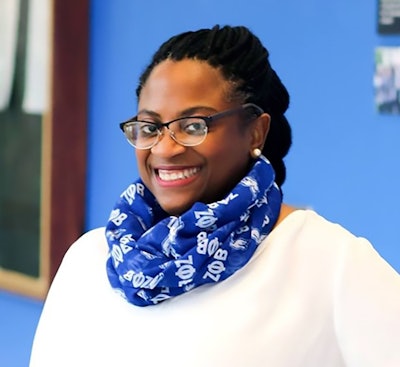 Dr. Yolanda Vivian Williams-Goliday
Dr. Yolanda Vivian Williams-Goliday
It is the responsibility and focus she carries as director of UIUC’s Gender & Sexuality Resource Center (GSRC), a role she has played for more than six months.
A Black and openly queer woman, Williams-Goliday serves as a guide of sorts, helping students navigate their identity and the world around them, and how they can continue to be authentic as they go about their studies and approach the workplace, she says.
“A lot of Black and Brown students that were in the community didn’t have anyone to look to when it came to their questions of who they were, how to be their authentic self when it comes to their orientation, their gender expression, [or] their gender identity,” she says.
Williams-Goliday has been helping guide students for decades, first as an academic adviser for Eastern Illinois University’s Office of Minority Affairs beginning in 1998. There, she worked with students academically underprepared for college, she says.
During her approximately 24 years at EIU, she also served as director of academic services for its athletics department; instructor in its African American studies department; and academic and retention adviser for its Office of Inclusion and Academic Engagement. And from 2002 to 2006, she served as academic adviser for Temple University.
Williams-Goliday holds a Ph.D. in educational administration (higher education leadership) from Indiana State University; a Master of Liberal Arts in African American studies from Temple; a Master of Science in Education in educational psychology and guidance (college student personnel) from EIU; a B.A. in African American studies and sociology from EIU; and an Associate of Arts in African American studies from Olive-Harvey Community College.
Coming out of the COVID-19 pandemic, Williams-Goliday described the students she advises as bright, progressive, and motivated activists, different from those of her own generation.
“They have a different way of looking at the world,” she explains. “They were in this world that was totally different. ... They couldn’t go to their parents or grandparents to [ask how to navigate this]. ... It was new for everyone.
“They’re coming out of that with this sense of: ‘I want to be valued and I want to be appreciated. I want to love what I do. I want to go into this world. And if my career is not fulfilling me, then I want to do something that fulfills me’,” she continues.
Williams-Goliday says she is unapologetic in her Black and queer identities. Matters of .gender and sexuality encompass both her life and her work. She says intersectional existence sometimes means having to educate one community on the plight and discriminatory rhetoric used against the other.
“Erasing anybody from what we call history … is dangerous,” says Williams-Goliday. “I sit in this [intersection] of Blackness and queerness and [have] to remind my queer scholars that Black lives matter and remind my Black scholars that LGBT lives matter.
“Erasing one of those erases who I am,” she says.
One of the goals she has in her current role is to create a multicultural building at UIUC that will house not only the GSRC but also other centers. That way, those seen entering the building are not outed, she says.
Another goal is to establish an LGBT Alumni Association.
“Our alums are very important,” says Williams-Goliday. “It is very important for our students to see themselves as an alum, but also see themselves in these different careers and how they can normalize being their authentic selves.”





















